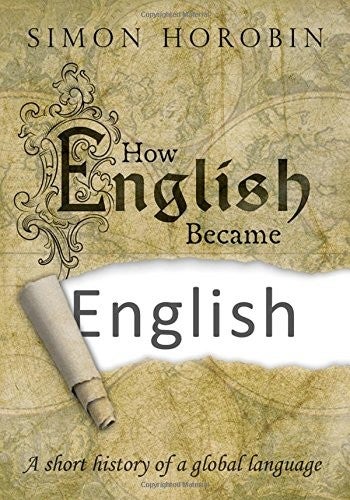Simon Horobin, How English Became English: A Short History of a Global Language: 'This is English? Well, that’s easy for you to say', book review
In 1582, English was used only by around seven million, by the 21st century 450 million spoke it worldwide

The English language is a mishmash. It evolved from a multiplicity of sources. It’s full of loan words and near-synonyms. Its spelling is historically eccentric. It is spoken in a wide variety of forms, often colourful, across the globe and, of course, it never stands still.
In 1582, English was used only by the five to seven million inhabitants of these islands. By the early 21st century that number had increased to around 450 million worldwide.
The huge lexicon and joyful quirkiness of English is both exciting and fascinating, although Simon Horobin is not in a particularly celebratory mood in this book. Only once did I smile and that was at the idea of the BBC bringing in Wilfred Pickles to read the radio news during the war – not as an enlightened move against John Reith’s rigid rules or the prejudices of the listeners but because it was thought that Pickles’ broad and fruity Yorkshire accent would confuse the Germans.
Horobin begins – rather unoriginally – by discussing what we mean by “English” given that it comes in so many varieties, and he somewhat laboriously illustrates the point in time-honoured linguistic fashion by comparing five versions of an extract from the Bible.
And is a language (any language) really only a dialect with a national flag anyway? Tok Pisin, for example, is one of the three official languages used in Papua New Guinea. It is an English-language creole. And a creole is a simplified version of English mixed with one or more other languages and used by non-native speakers as a lingua franca. The debate is whether or not we should regard this as a language in its own right or not.
English originated as an Indo-European Germanic language dating back to at least 200BC and there are no written records of it. A thousand years later it had arrived in Britain courtesy of the post-Roman Anglo Saxon invasions and was well established as what linguists call Old English, the language of, for instance, Beowulf.
The next thousand or more years brought Norman French, centuries of reliance on Latin which produced thousands of loan words, the influence of the crusades, voyages of discovery, global colonisation and more as the language passed through the Middle English of Chaucer and the early modern English of Shakespeare.
Today, it continues to change and develop rapidly, not least because of modern digital technology. Jonathan Swift’s comment that “It is better that a language should not be wholly perfect than that it should be perpetually changing” seems more quaint and extraordinary than ever.
Since the 1960s, most professional linguists have taken a descriptive rather than a prescriptive approach to the English language. And Horobin, who argues that “attempts to purify and control English are often driven by social, moral and racial agendas”, is firmly in the former camp.
He cites the influential prescriptivist W H Fowler (Dictionary of Modern English Usage, 1926) and the more discursive and increasingly descriptivist updates by Robert Burchfield, 1995, and Jeremy Butterfield, 2015, as evidence for the change in approach during the past 90 years. He concedes, however, that “Fowler” continues to be a very strong brand, hence the ongoing use of his name.
Of course there are still writers such as John Humphrys and Lynne Truss who take strong and often witty exception to the anything-goes-as-long-as-meaning-is-clear attitude, but Horobin argues that no serious linguist would. And he suggests that Waitrose, in carefully writing “Ten items or fewer” over one of its checkouts, is deliberately allowing its customers to feel “a sense of social and intellectual smugness and superiority” which, like a number of things in this book, seems to be something of an overstatement.
Horobin has, for instance, reservations about the way in which Latin has influenced the study of English, especially since the 18th century. He emotively laments that “the prestige of Latin has continued to infect accounts of English grammar up to the present day” (my italics).
Then there’s his sweeping assertion that “those in favour of preserving the Union [with Scotland] will be content to view their language as closely affiliated to English”.
There’s a lot of detailed information in this succinct book and it’s very readable, although Horobin often strays dangerously close to the fine line between accessible and patronising. It could be a useful starting point for A-level students embarking on an English language course and completely new to the subject.
For those more experienced in this subject, however, it doesn’t offer much that hasn’t already been amply covered by, for instance, Henry Hitchings in his The Secret Life of Words (2011), Robert McCrum (et al) in The Story of English (1987) and in David Crystal’s many fine books.
How English Became English: A Short History of a Global Language, by Simon Horobin. OUP, £10.99
Join our commenting forum
Join thought-provoking conversations, follow other Independent readers and see their replies
Comments
Bookmark popover
Removed from bookmarks